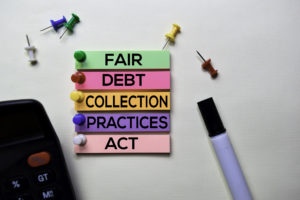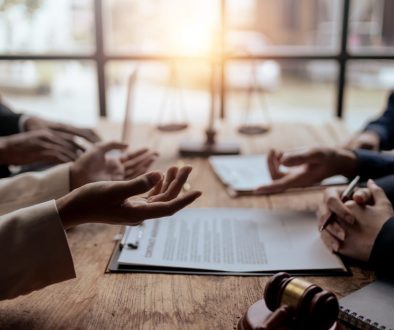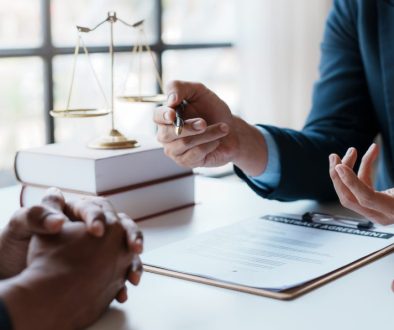The Fair Debt Collection Practices Act (FDCPA) was enacted in 1977 by the Federal Trade Commission to protect consumers from abusive debt collection practices. It aimed to ensure that people are treated fairly and are not subjected to harassment, threatened, or publicly shamed for their debt.
The FDCPA governs collection agencies. Calls from your credit card company, an original creditor, or other financial companies that issue loans are not subject to these federal rules. However, some state laws offer consumer protection laws that include these financial institutions.

Two rules (issued in October 2020 and December 2020) which address debt collection in today’s world of electronic communication went into effect November 30th, 2021.
National Legal Center is committed to defending your rights as a consumer.
Read on to learn where the FDCPA and social media collide and how to protect yourself from debt collection harassment on social media.
Why are debt collection rules changing?
Put into law in 1977, the Fair Debt Collection Practices Act governs what collection agents can and can’t say, as well as the modes of communication. Specifically, it covers communication through phone, mail, and fax. That’s right—paper facsimile was a real mode of communication when the law went into effect!
Fast forward 44 years and updates to the law will now address the advances in technology that have occurred since then.
Among the most notable changes is that collection agencies may now use social media to contact people who owe them money.
Social media has become one of the most popular methods of communication.
It is where we get our news, connect with friends and family, and share our successes and worries. As such, it became a natural medium for debt collectors looking for opportunities to contact people they are trying to collect debts from.
While this may seem an intrusive and unwelcome turn of events, it has passed, and social media is officially open to collectors.

FDCPA Update: What’s changed?
The update to the FDCPA covers several areas and generally focuses on the methods and frequency of communication. However, the spirit of the law remains the same— to ensure consumers are treated fairly.
Much has already been written about the broad changes that have taken place in this FDCPA update. We would point you to a thorough overview of the new rules from resources made available by the National Consumer Law Center and the Consumer Financial Protection Bureau.
Among the most notable updates to the law:
- Collection companies must wait seven days to call again after speaking with the debtor.
- Debt collectors may now send private social media messages, as well as text messages to collect a past-due debt.
- The new rule places restrictions on how and when they can contact consumers to collect on past due accounts.
We’ll be diving in on the other specific provisions of the law in future articles. We’re beginning with the social media component, as that may come as a surprise for consumers.
How do changes to the FDCPA affect your rights as a consumer?
The new provisions in the FDCPA open several ways for collection agencies to contact you.
In addition to calling or sending messages through postal mail and fax, they now have the option to text, email, or send a private message through platforms like Facebook, Twitter, and LinkedIn.
Your rights as a consumer are largely unchanged.
You still have the right to be treated fairly and keep your financial matters personal. In all cases, the collection agent must identify themselves and state that they are attempting to collect a debt. They are not allowed to use obscene, abusive, or threatening language and must comply with the consumer’s request to cease communication.

What should you do if a debt collector contacts you through social media?
If a collector contacts you online, don’t panic! Just like with any communication, you have options.
If our consumer rights law firm already represents you to resolve your debt, you’ll take the same actions as if they were to send a collection letter by sending it in for your legal team to review.
It is always best to have an attorney review any communication from collection agents. Especially as they have new communication methods, there’s a good chance that they may “accidentally on purpose” make a mistake under the presumption of grace with the new rules.
If you are not represented by our law firm for debt matters and a debt collector makes you feel harassed or uncomfortable, our legal team is here and ready to help. A free consultation is your first step.
Included in the new rules is a provision that allows consumers an opt-out option of any method of communication from a collector.
If they call, you can tell them not to call any longer, and the request should be honored. The same rule applies to receiving a message from a debt collector on social media. You can respond by saying that you do not want them to message you on the platform, and they should honor the request.
Remember- asking them to stop contacting you does not make the debt disappear. They may still pursue other collection methods if it is a valid debt. Debt collection lawsuits are very real, and if a collector has no other way to get in touch with you, they may choose to file a lawsuit.
If you aren’t sure of the best way to deal with debt collection calls or messages, complete the form below to request a free consultation with a member of our legal team.
Can a debt collector send me a Facebook message?
Yes, a debt collector can message you through Facebook. The amendments to Regulation F of the FDCPA went into effect on November 30th, 2021. As a result, debt collectors can now communicate with debtors through social media platforms.
The new rule includes an opt-out option that allows you to inform them you do not wish to be contacted through any particular method.
Can a debt collector post publicly about me on Facebook?
No. The new rule of the FDCPA continues to protect consumers from debt collectors making information about a debt publicly available. If a collector has posted publicly about your debt, you may choose to file a claim against the collector and may be awarded damages.
What should I do if a debt collector sends a Facebook message?
When a debt collector contacts you on Facebook, first consider whether or not it is a legitimate debt collector and not a scam. Several concerns are raised by the new rules of the FDCPA. Notably, scam artists now have a new way into victims’ pockets.
Suppose you want to engage the debt collectors and resolve the debt. First, request that they identify themselves. Make sure they are the ones providing information, not the other way around.
Once they provide their name and the name of their company, it’s time to confirm. Consider calling their agency to make sure they are who they say they are and take the conversation to phone calls which are likely to be more secure. Facebook is not the best place to discuss financial matters that involve your Personally Identifiable Information. Even if it takes a bit of extra time and effort, it is better to deal with the debt in a way that keeps you safe.
If you do not believe the debt is valid, you can request that they provide a validation of the debt. The new rules allow you to make that request through any method, so you can even request it right on that message.
If you do not want to engage the debt collectors, you can ignore them or ask that they no longer contact you. This does not resolve the debt or your obligation to pay. Still, you do have the right to opt out of communicating with them through any particular vertical.

What should I do if a debt collector sends a text message?
Just as above, if a debt collector contacts you through a text message, your first step is to determine whether or not you believe the person to be whom they say they are. If you are confident that they are a valid debt collector, you will proceed based on your goals.
- Do you want to settle the debt?
- Are you prepared to make a payment plan?
- Do you need more information to decide if you really owe what they say you owe?
If you are unsure how to proceed, consider learning how a debt settlement attorney can help by contacting us through the form at the bottom of this page.
How to Protect Yourself from Debt Collectors on Social Media
Debt collectors are just now able to contact consumers on social media. However, they have long been familiar with using the platforms to learn about the people they are trying to reach.
Here are several ways to protect yourself from debt collectors on social media.
Keep your pages private.
We all love to celebrate our life-wins with our social networks. New cars, homes, jobs- we share all of life’s successes with our friends and family.
You probably weren’t considering the debt collectors who were zooming in to look at your ID badge to figure out where you work, though, were you?
Every platform has its own (wickedly confusing) set of privacy options and controls. Set your pages to private to ensure you are only celebrating with those who are in your corner.
Limit the Personally Identifiable Information you share.
Whether you choose to keep your social pages private or not, it is still wise to keep your Personally Identifiable Information off of your page. Information such as your phone number, email address, mailing address, and birthday are all gold for debt collectors who are trying to confirm that the profile they are looking at is actually yours.
Don’t accept that random friend request.
We’ve all received the random friend request.
Maybe it’s a super cool person we’d like to befriend, a gorgeous soul-mate, or a business opportunity we can’t miss out on. Is any of that likely to be the case, though?
If you aren’t sure who they are, there’s probably not much to gain by bringing them into your online world.

Don’t post pictures with identifying information.
Less is definitely more when it comes to protecting yourself from debt collectors on social media.
Sharing a picture of your favorite coffee shop you go to each day on your lunch break or your planned trip to visit a family member (who you tag, naturally) is innocent and friendly. However, it can lead a collector to find and call said person or place to anger or embarrass you into calling. No, the collection agent can’t divulge that they are calling to reach you about a debt. Still, you (and possibly the person they’ve called) know what the “personal business matter” they’re calling about is.
This may feel extreme, but debt collectors are smart, resourceful, and trained to locate debtors and get them on the phone. Following the above suggestions of keeping your page private and ignoring random friend requests will allow you a bit less to worry about on this front.
How to Deal With Debt Collection Harassment on Social Media
Suppose you have found yourself in a situation where debt collectors are harassing you. In that case, there are actions you can take to protect yourself.
Keep a record.
While it may seem like an obvious suggestion, it is important to keep good records of whom you have talked to, when, and what was said. This includes recording the social media messages by taking a screenshot or printing the conversation.

Be clear and direct.
If a collector is harassing you, be very clear about what is happening and why it’s not OK with you. Avoid getting pulled into an argument of any kind. Keep a level head and end the conversation. Unlike phone calls, when the communication is electronic, you can’t exactly hang up to end the conversation. However, you can ignore the private messages and return to them later if you choose to do so.
Contact an attorney.
If the debt collector’s behavior becomes too much for you to handle, or if you think they are violating the law in any way, contact an attorney. The consumer advocates at National Legal Center may be able to help you turn the tables to take legal action against the harassing agency and protect your rights.
In Summary
Debt collectors are now able to contact debtors through social media. This is a recent change to the FDCPA that raises a number of concerns for consumers.
First, don’t share personally identifiable information on your social profiles or accept friend requests from strangers. Secondly, keep good records of what a collector says, how often they contact you, as well as their methods for contacting you. Finally, if you feel you are being harassed or need help dealing with your debt, reach out to an attorney to help protect your legal rights.
The consumer advocates at National Legal Center focus on debt collection harassment. If you feel like you are being harassed by debt collectors, please reach out to us for a free consultation. We will help you understand your legal rights and options to #standuptodebt today!
Use the form below to easily get in touch with us.




